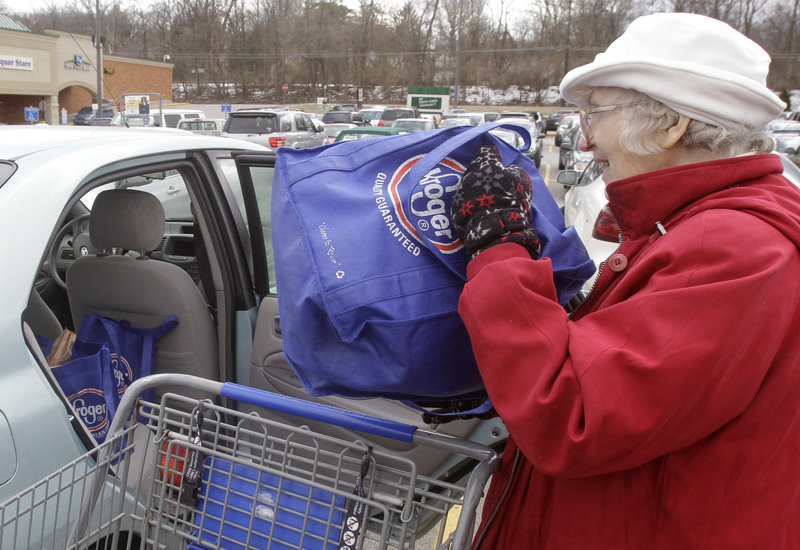CINCINNATI – Supermarkets are finding a little bit of green doesn’t make a big difference in breaking shoppers of the “paper or plastic?” habit.
Some chains, including Kroger and Safeway, are starting to move away from the pennies-per-bag rebates, saying they don’t do enough to keep customers from forgetting reusables at home or in their cars.
Grocers save money when customers bring reusable bags. They also want to stay ahead of plastic-bag bans and taxes that could cost them or their customers more money.
Kroger Co., the nation’s largest supermarket chain, had been giving 3- to 5-cent rebates or fuel discounts for each reusable bag. But it ended the bonuses this year in some regions. Customer feedback indicates most want to use reusable bags, company officials say; it’s a matter of making it a habit. So Kroger officials say they’re focusing more on promotions and educational efforts, investing in signs and other visible reminders.
Now, many Kroger parking lots are dotted with signs asking “Are your reusable bags still in the car?” Messages around stores tout the environmental value of bag reuse. A reusable bag replaces hundreds of disposable bags, one says; another: “Less Plastic? Fantastic.” Kroger also sent shoppers coupons for reusable bags.
Kroger spokesman Brendon Cull says the company has found no significant difference between reusable bag frequency in markets with rebates and those without them.
Safeway Inc. also has been phasing out cash rebates such as 3 cents per bag in some regions. It’s still dangling discounts, but making them more occasional and targeted. Shoppers who use Safeway’s “Bright Green” reusable bags get 10 percent off Safeway’s line of environmentally geared household products.
Moral appeals and trendiness are more powerful than small discounts, said Ted Brown, a consultant who helped develop one of the earliest reusable bag programs two decades ago. Make reusables fashionable and fun, and shoppers won’t forget.
About 95 percent of food retailers offer reusable bags, the Food Marketing Institute says. In 2010, half of shoppers said they “try” to bring reusable bags, up 10 percent over 2009. However, half reported their use as never or less than monthly. That figure isn’t falling much.
“Getting consumers to change their habits is difficult under any economic conditions,” said Joel Makower, a consultant and executive editor of Greener World Media Inc. “Stubbornness is recession-proof.”
Copy the Story Link
Send questions/comments to the editors.



Success. Please wait for the page to reload. If the page does not reload within 5 seconds, please refresh the page.
Enter your email and password to access comments.
Hi, to comment on stories you must . This profile is in addition to your subscription and website login.
Already have a commenting profile? .
Invalid username/password.
Please check your email to confirm and complete your registration.
Only subscribers are eligible to post comments. Please subscribe or login first for digital access. Here’s why.
Use the form below to reset your password. When you've submitted your account email, we will send an email with a reset code.